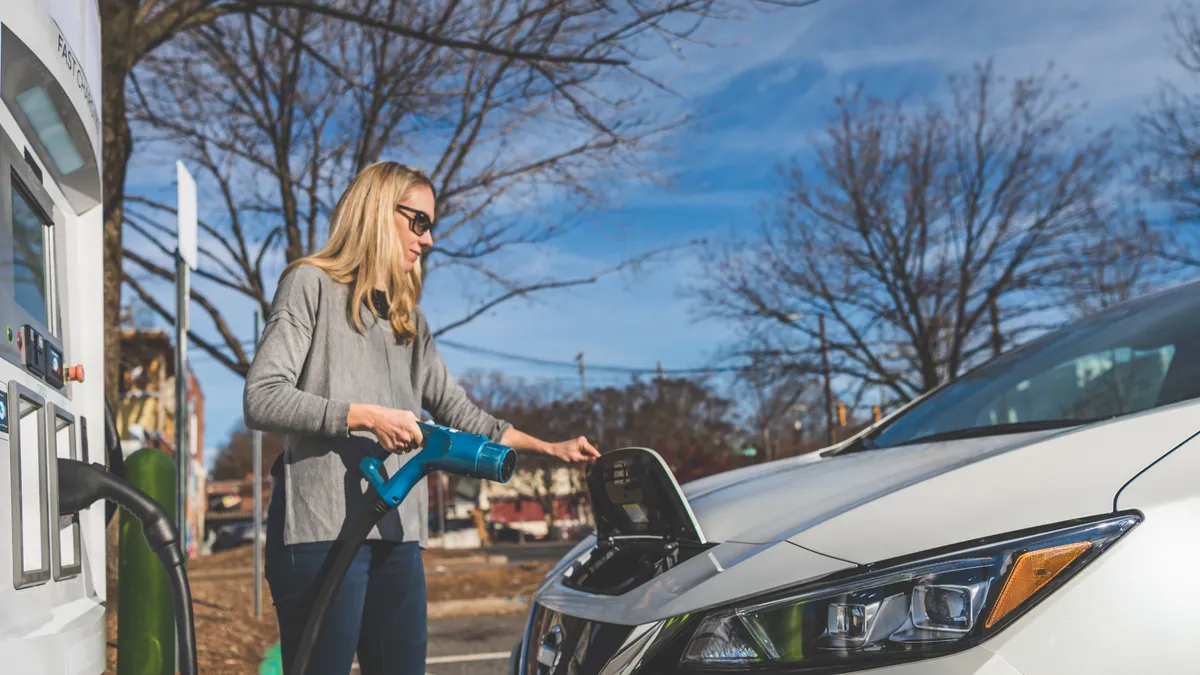Dive Brief:
- Duke Energy has made modifications to its proposed electric vehicle (EV) pilot and on Friday filed a settlement with the North Carolina Utilities Commission (NCUC) that resolves competitive issues raised by ChargePoint in earlier filings.
- The state wants to see 80,000 zero-emission vehicles on its roads by 2025, and Duke says its program is essential to reaching that goal.
- The agreement with Duke allows for greater customer choice of equipment, software and pricing structures, ChargePoint Vice President of Customer Solutions Charlotte Ancel told Utility Dive. The utility has also offered to scale back its $76 million EV offerings, to accommodate objections from NCUC Public Staff, which acts as a consumer advocate in the state.
Dive Insight:
Duke's electric vehicle pilot consists of seven individual programs, including $1,000 rebates for residential chargers, incentives for fleet equipment, and an electric school bus charging initiative. Modifications to the pilot have brought on board ChargePoint, which operates the nation's largest charging network and had opposed the plan over concerns it limited customers' ability to choose their preferred charging equipment.
But NCUC Public Staff, in a proposed order, told regulators it stands by its previous objections that the set of programs is too large to be considered a proof-of-concept.
"As well-intentioned as Duke's proposals may be, it is inaccurate to call the proposed programs 'pilots,'" Public Staff said in its proposed order.
Duke's proposed offerings focus on EV charging management, transit electrification and the expansion of public charging.
According to the customer advocate, Duke's proposed electrified transportation programs are designed to obtain infrastructure-related data that is likely already publicly available, or will be available within the next year to 18 months from other utilities and jurisdictions. That data includes load patterns related to EV charging, the impact of managed charging, and how managed charging can shape load patterns and customer charging behavior, said Public Staff.
"At best, only the Residential EV Charging and Fleet EV Charging programs arguably qualify as pilots" while other programs are not reflective of larger potential offerings or "are merely capital projects," Public Staff said. There are also "critical omissions" from those programs that would support their approval, including experimental rate designs or data collection that cannot be achieved otherwise.
Public Staff's arguments are really that they don't see it as a pilot proposal, "they see it as a real program that we've misnamed," Lang Reynolds, Duke's director of electrification strategy, told Utility Dive. "Their opposition seems to be somewhat procedural. ... We think there are grounds for proposing it as a pilot, given there's no real framework for [EV] investment as a utility in North Carolina necessary to gather data."
"We did offer some areas where we were willing to scale back on the Level 2 side of things," Reynolds said.
Seeking to address Public Staff concerns, Duke's own proposed order offers to remove programs that involve multi-family charging stations and the public Level 2 charging stations. That, the utility said, would result in a decrease of approximately $4.1 million from the overall cost of the pilot.
To address competitive concerns from ChargePoint, Duke is allowing customers and site hosts greater flexibility in charging equipment. Previously, the utility would have executed a request for proposals yielding a single vendor but will now allow for customers to pay for upgrades around a base option.
Participating customers in the residential program "will have unlimited choice" of Level 2 hardware, the utility said in its proposed order. In the electric school bus charging program, the settlement provides for equipment to be installed on the customer side of the meter, with participating customers having a choice of two or more vendors of charging hardware and software.
"We're still going through a competitive process to select vendors," said Reynolds. For all of the offerings "there will be a base option and at least one other option for hardware and software. We haven't committed to procuring any particular vendor."
ChargePoint says that with Duke's modifications, it now supports the program.
"We wanted to make sure EV drivers in North Carolina, and also for the people hosting chargers on their property, they had the opportunity to choose what type of hardware and software they want," Ancel said. "We wanted to ensure Duke's program was designed to enable choice ... As initially proposed, it was not."
Duke proposed the EV pilot last spring, and has broad support for the three-year set of programs.
The North Carolina Justice Center, Southern Alliance for Clean Energy, Environmental Defense Fund and the Sierra Club say they want to see the pilot approved. The groups also recommended NCUC convene a stakeholder advisory council to oversee the components of the EV pilot, and require Duke to file quarterly reports.
Electric vehicle charging company Greenlots is also supporting the program, and says that "taken as a whole, the components of the entire proposed pilot program are an experimental trial of an appropriate scale and design." The program will return "necessary and valuable learnings to inform grid planning and investment decisions," the company said.
While NCUC could request more information before making a decision, Duke officials say regulators now have a record sufficient to approve the pilot.
"The goal is 80,000 EVs by 2025, which is less than five years away," said Reynolds. "We don't really see a path to get there without a strong utility program."















